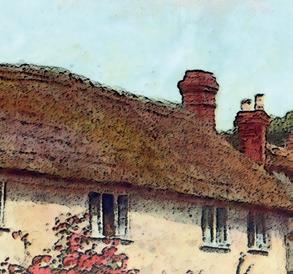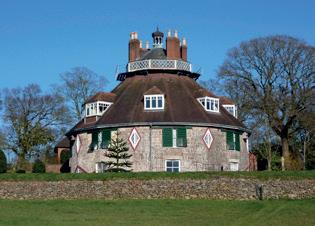
6 minute read
Well, fancy that!” Think you know Devon? Find out how the county lays claim to some amazing records, whether it is the oldest, newest, narrowest, longest or just plain quirkiest


Advertisement


Think you know Devon? Whether it’s the oldest, newest, narrowest, longest or just plain quirkiest, the county can lay claim to some interesting world and country records. Here are our favourite ‘Top 10’ amazing facts about our amazing county.
Devon...has the only place in the country with an exclamation in its name!
The seaside village of Westward Ho! was named after the 1855 Charles Kingsley novel of the same name, set in nearby Bideford. Canny local tourism entrepreneurs spotted the marketing potential of naming the village after a bestselling novel, evoking the spirit of the wild, beautiful and rugged north Devon coastline. It is also thought to be the only place in the country named after a work of fi ction.
Devon...is home to the UK’s oldest human
Devon...has the country’s only 16-sided house


In 1784, Jane Parminter, intrepid daughter of a wealthy Devon wine merchant, set off on a grand tour of Europe accompanied by her sister Elizabeth, cousin Mary and their friend Miss Colville. On their return, and supposedly inspired by a 6th century Byzantine basilica in Ravenna, spinsters Mary and Jane commissioned A La Ronde near Exmouth, the only 16-sided house in the country. With a passion for design and collecting, the interior is as unique and eclectic as the building itself, complete with a frieze made from real birds’ feathers and, perhaps most famously, a shell-encrusted gallery containing nearly 25,000 shells. Kents Cavern in Torquay can be rightly proud of the Kents Cavern Jawbone, found in the Vestibule Chamber in 1927 as it is the earliest evidence of Homo sapiens or modern man found in the whole of Britain and north-west Europe, and is thought to date to around 42,000 years ago. Not only does this make it one of the most important prehistoric caves in Europe, but it also holds the accolade for being the only known site in the world that has evidence of three diff erent human species - Homo Heidelbergensis, Neanderthals and Homo sapiens - occupying it throughout time, giving it a connection to humankind dating back over half a million years.
Devon...Is the home of the last castle ever built in England
Showing appearances can be deceptive, despite looking every inch the archetypal medieval castle, Castle Drogo actually dates from the 1930s and is the last castle ever to be built in England. In 1910, businessman Julius Drewe bought about 450 acres south and west of the village of Drewsteignton and asked Edwin Lutyens to build him a castle. The castle’s traditional ‘defensives’ are purely decorative and it had all the mod cons available at the time, with electricity supplied by two turbines from the river below, and even lifts!
Devon...has more roads than anywhere else in the whole country – and probably the slowest!

but apparently Devon County Council has responsibility for 8,000 miles of road, which makes it the longest network in the country. Devon’s roads range from tiny trackways, rural lanes, major dual carriageways (like the A38 and A30) and the mighty M5. As well as the length of our road system, international travel experts who provide live traffi c data to broadcasters, have also previously reported that ‘pre-lockdown’ Exeter had slower rushhour traffi c than London!
Devon...has the narrowest ‘proper’ street in the world (or perhaps just the UK!)


Despite the ‘offi cial’ world record belonging to a street in Germany – which looks more like a passageway between two houses - Parliament Street in Exeter is certainly the narrowest proper street in the United Kingdom and it is obviously so sure of its global credentials that it bears a plaque proclaiming it to be the narrowest in the world! It measures from 1.22 metres (4 feet) at its widest point, slimming down to about 0.64 metres (just over 2 feet) at its narrowest. History tells us that it used to be called Small Lane but was renamed Parliament Street as a not very subtle joke against the Government when they passed the 1932 Reform Bill.

Jacka Bakery on Plymouth’s Barbican can lay claim to being the oldest working bakery in the country. With at least 400 years of trade under its belt, the original bakers are known to have made biscuits that went on The Mayfl ower to feed the Pilgrim Fathers as they set sail for the New World in 1620. Devon also used to be home to the country’s oldest hotel, the Royal Clarence in Exeter, until its unfortunate demise in a catastrophic fi re in 2016.
Devon...has the oldest cinema in Europe
The Torbay Picture House, situated in Paignton, is believed to the be the oldest surviving purpose-built cinema on the entire continent. Opening in March 1914, the cinema could seat 383 customers and featured a 21-piece orchestra, with each member paid a guinea to perform. The cinema sadly fell into decline and shut its doors to paying cinema-goers in 1999. Since then, the Paignton Picture House Trust has been awarded a grant by Historic England towards its restoration, covering the full cost of essential repairs to the intricate stone work and unique stained glass windows. It is hoped the project can bring the old cinema back to its former glory in the years ahead.



Devon...was the last place in the country to execute witches
Despite the barbaric practice of executing witches falling largely out of favour at the end of the 17th century, the last English executions for witchcraft saw
Temperance Lloyd, Susannah Edwards and Mary Trembles hanged in Exeter in 1682. Three years later, Alice Molland was put to death in Heavitree. They were accused of ‘having a discourse or familiarity with the devil’ as well as using magical arts, sorcery and witchcraft, and their shocking end is now recognised with a dediction plaque at Rougemount Castle.


Devon...‘invented’ the fi rst Jack Russell Terrier
There may be some dispute about this ‘fact’ in terms of authenticity, but it makes a great yarn – when the Reverend John Russell (who was born in Dartmouth, went to school in Plympton and was rector at Black Torrington) allegedly bought a dog from a passing milkman. If the only painting of it is anything to go by, the dog – called Trump – was a bit ugly, with a squirrelly tail, stumpy legs and huge ears, but also had a predilection for digging up foxes that had gone to ground which perfectly suited the clergyman and his love of hunting. The tenacious and gutsy little breed was thereafter known by the name of its owner.











